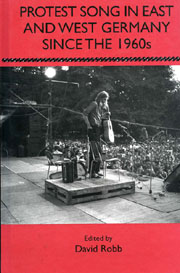Book contents
- Frontmatter
- Contents
- Acknowledgments
- Introduction
- 1 The Reception of Vormärz and 1848 Revolutionary Song in West Germany and the GDR
- 2 Mühsam, Brecht, Eisler, and the Twentieth-Century Revolutionary Heritage
- 3 Narrative Role-Play as Communication Strategy in German Protest Song
- 4 The Burg Waldeck Festivals, 1964–1969
- 5 The Folk and Liedermacher Scene in the Federal Republic in the 1970s and 1980s
- 6 Konstantin Wecker: Political Songs between Anarchy and Humanity
- 7 Wolf Biermann: Die Heimat ist weit
- 8 Political Song in the GDR: The Cat-and-Mouse Game with Censorship and Institutions
- 9 The Demise of Political Song and the New Discourse of Techno in the Berlin Republic
- Works Cited
- Notes on the Editor and Contributors
- Index
4 - The Burg Waldeck Festivals, 1964–1969
Published online by Cambridge University Press: 05 February 2013
- Frontmatter
- Contents
- Acknowledgments
- Introduction
- 1 The Reception of Vormärz and 1848 Revolutionary Song in West Germany and the GDR
- 2 Mühsam, Brecht, Eisler, and the Twentieth-Century Revolutionary Heritage
- 3 Narrative Role-Play as Communication Strategy in German Protest Song
- 4 The Burg Waldeck Festivals, 1964–1969
- 5 The Folk and Liedermacher Scene in the Federal Republic in the 1970s and 1980s
- 6 Konstantin Wecker: Political Songs between Anarchy and Humanity
- 7 Wolf Biermann: Die Heimat ist weit
- 8 Political Song in the GDR: The Cat-and-Mouse Game with Censorship and Institutions
- 9 The Demise of Political Song and the New Discourse of Techno in the Berlin Republic
- Works Cited
- Notes on the Editor and Contributors
- Index
Summary
The Cultural Momentum of the Jugendbewegung in the Early 1960s
At the universities of the Federal Republic in the first half of the 1960s there was a widespread type of student that was non-conformist, had a strong aspiration for independence, and was less interested in a bourgeois career than a self-determined life — preferably as a free artist and bohemian. The style for males was smoking a pipe, sporting a beard, and wearing parkas and long scarves in winter, jeans and wooden clogs in summer; for female students it was long hair, pullovers, and trousers. A preoccupation with the Nazi past led to far-reaching conflicts within families and an inner opposition to “society,” which many tried to escape from for as long as possible. Hitchhiking was a popular means of travel because of its association with the feeling of boundless freedom. Hitchhiking journeys led through Europe to the North Cape or to Scotland, Istanbul, Cape Sunion, or even to Vienna or Paris for a quick breakfast; the romanticized selfimage was that of a “noble vagabond” standing apart from society. Serving one's mandatory eighteen months in the military was frowned upon. Those who wanted to avoid military and community service went to study in West Berlin, where the draft did not apply due to the special status of the city. Günter Grass's Die Blechtrommel became a cult book, its antihero Oskar Matzerath wreaking chaos among the marching columns with the counter rhythms of his drum, and Enzensberger's poem “Was habe ich verloren in diesem Land” encapsulated the self-image of the individual.
- Type
- Chapter
- Information
- Protest Song in East and West Germany since the 1960s , pp. 97 - 132Publisher: Boydell & BrewerPrint publication year: 2007



